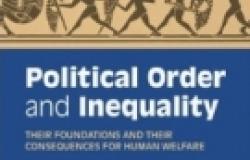Book Review: Political Order and Inequality

Political Order and Inequality: Their Foundations and their Consequences for Human Welfare by Carles Boix (Cambridge: Cambridge University Press, 2015). 334 pp. ISBN: 9781107461079
This is one of those rare books which elicits a “Wow!” at the sight of the table of contents, a “Wow!” when one reaches the end several days later, and many more in between. I imagine that Adam Smith’s Wealth of Nations provoked a similar response from its early readers, if in different languages.
Boix presents nothing less than a theory explaining why we humans have constructed the state (an organization with the capacity and incentives to monopolize violence and enforce order); why virtually no-one in human history experienced economic growth and sustained welfare improvements until two centuries ago; and why the “modern breakthrough” occurred as the small fraction of the world’s population first in Northwest Europe and extending to the zone we call the West experienced economic growth and (for the most part) welfare improvements over the past one to two centuries.
The time scale is the very longue durée. It starts with “forager” or hunter and gather societies before the dissemination of intensive agriculture around 4,000 BC (and still today on the capitalist fringes). The initiating questions are: what explains the emergence of spontaneous (non-institutionalized) cooperation among forager societies, and what explains the lack of economic growth? The time scale ends with the emergence of western capitalism and liberal democracy after the Industrial Revolution and their spread in mutating forms around much of the world by the late twentieth century.
The overarching theory includes explanations for: (1) the emergence of differential technological change between human societies, and hence differences in agricultural productivity, population growth, urbanisation and warfare capability (horizontal inequality), (2) the emergence of wealth and income inequality within human societies (vertical inequality), and (3) the emergence of the state (institutionalized political authority) in two main forms – monarchies/dictatorships and republics.
Out of this combination comes a theory of millennia-long economic stagnation, and a linked theory of what caused the emergence of built-in (“endogenous”) economic growth in most of the West. The explanation of stagnation gives central causal place to specific political institutions which, coming out of the agricultural revolution (together with successively stronger metals and fortifications), froze the distribution of political power between two strata (see below) and froze wider economic development.
The main narrative runs as follows. Forager or simple agricultural societies experienced differential technological change (e.g. irrigation, improved fish traps in reverine environments). At this point two basically different strategies emerged. Those who benefitted from the new technologies and became more productive (achieved a comparative advantage in production) preferred to continue with the existing cooperative equilibrium (“the producers”). Those who saw themselves disadvantaged had an incentive to loot or plunder the output of the more productive individuals or societies (“the looters”). The result could be a Hobbesian world of systematic conflict.
At some times and places a state emerged which restored peace. Boix distinguishes two basic types of states. The more common was created by the looters (also known in the literature as “roving bandits”) when they restrained themselves from plunder and invested in providing permanent protection to producers in return for some continuous flow of resources (food, labor, money) from the latter; they became “stationary bandits”. They tended to create states of monarchical or dictatorial type. Less commonly, the producers succeeded in creating a state and kept control of the levers of power, setting up defensive structures to deter potential looters. The resulting political order took a “republican” form, with an elected leader, a governing committee, an oligarchy of traders, a general assembly, in varying combinations (as in some classical Greek polis and medieval and modern European city-states).
The monarchical/dictatorial states kept order through a system of privileges, favours, and side-payments which distorted competition and inhibited innovation. The advantaged governing classes opposed technological changes they could not control, which might strengthen the power of challenger social groups. This is the basic theory of economic stagnation.
The “modern breakthrough” rested on ecological and political conditions. The necessary (but not sufficient) ecological condition was the combination of rich soils and salubrious climate for crops and livestock, able to allow for a growing non-agricultural population. By 1800 Western Europe (not including Mediterranean Europe) had a substantially higher share of total population living in urban centers than any other region, including East China and Korea. Economies of agglomeration and scale in urban concentrations fostered faster technological change and the creation of skilled artisans in the two main industrial activities, textiles and metals, able later to take the scientific breakthroughs of the seventeeth and eighteenth centuries and run with them.
The necessary ecological condition in Western Europe combined with three broadly political sufficient (but not necessary) conditions. One was the initial political fragmentation of the continent, which allowed for more producer-governed towns with more autonomy from land-based state power than in the European Mediterranean or Asia. A second was the arrival of a more effective and more capital-intensive means of violence than the horse and the pike: guns. Commercial towns could raise the large-scale resources needed to buy and deploy guns on a “level playing field” with oppositional, landed groups. The growth of commercial and urban strata then accelerated learning-by-doing (endogenous technological innovation ), which matured into the Industrial Revolution. After that came the third political condition: the “embourgeoisement” of old, landed elites. The landed classes, instead of protecting the growth-inhibiting institutions which underpinned their earlier rule, invested in the emerging industrial sectors, sharing in the gains and acquiring a vested interest in the political and legal consolidation of the new order – of a relatively liberal, market-friendly kind compared with what went before.
This bare-bones account has about as much connection to Boix’s discussion as a cemetery has to the living society above. As it proceeds the book lays out, with crystal clarity, similarities and differences between its arguments and those of prominent approaches to similar questions: including functionalism, Marxism, and especially differences with the popular neoinstitutionalism represented by Douglass North, Daren Acemoglu, James Robinson and many others. It also provides abundant empirical evidence relevant to its core arguments.
That is why the “Wows” come all the way through, not just at beginning and end.
At the same time, we can note that the grand scope of the argument leads to analytical categories – notably, producers and looters, and monarchies/dictatorships and republics – which are inadequate for closer-in examination of western capitalism over the past several decades. It might, however, give a starting insight into dominant tendencies: namely, that latter-day looters – owners and managers of finance – have achieved dominance over producers (we call this “financialization of the economy”), yielding not a monarchy or dictatorship but a looters’ republic, in the form of Wall Street’s capture of the legislative and executive commanding heights of the state in the United States, for one. To elaborate the insight, one needs to draw on, for example, Michael Moore’s film Capitalism: A Love Story, Robert Kenner’s film Merchants of Doubt and the book of the same name by Noami Oreskes and Erik Conway, Thomas Piketty’s Capital in the Twenty First Century, Tim Besley and Thorsten Persson’s Pillars of Prosperity, George DeMartino’s edited Oxford Handbook of Professional Economic Ethics, and George Akerlof and Robert Shiller’s Phishing for Phools.
Robert H. Wade is Professor of Political Economy at the London School of Economics, and winner of the Leontief Prize for Advancing the Frontiers of Economic Thought. He has written this review for International Affairs, the leading international relations journal.


